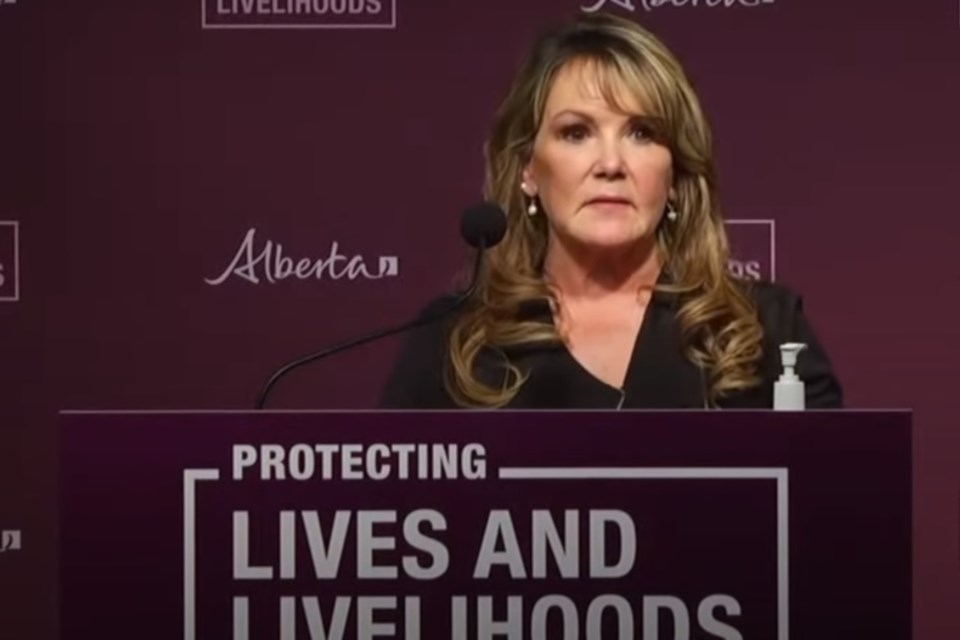ATHABASCA, BARRHEAD, WESTLOCK - It is another tool in the toolbox to fight domestic and intimate partner violence and it gives family and friends the opportunity to request information about their loved one's partner if they see red flags.
Disclosure to Protect Against Domestic Violence, or Clare’s Law came into effect April 1 in Alberta, named after Clare Wood, a British woman who was murdered by a former domestic partner who police knew to be violent. The law gives the ‘right to ask’ allowing anyone to request information from the police about a potential abuser and the ‘right to know’ which, under guidelines in the law, allows law enforcement to release information on their own to a member of the public.
At the April 1 press conference, Minister of Community and Social Services Rajan Sawhney said 204 Albertans died as a direct result of family violence between 2008 and 2019.
“It's important to know that domestic violence can affect anyone and it can hurt people of any age, ethnicity, gender, or sexual orientation,” Sawhney said. “Alberta is a currently the fourth highest in Canada for rates of police reported intimate partner violence. In fact, Lethbridge has the highest rate in the country for both police recorded family violence and intimate partner violence.”
She noted the government has maintained $51.5 million in funding for emergency shelters and added an additional $6.1 million for not only women’s shelters but second stage shelters, elder abuse shelters, outreach programs and prevention initiatives.
“Tools like Clare's law will help us deal with the issue before it even begins. We believe people at risk have a right to know if their partners have histories of violence or abuse. We believe, I believe that this law will save lives,” she said.
If an application is made under Clare’s Law there are procedures in place to prevent it from being abused, including that the person making the application must meet with law enforcement and if they refuse the application will not be continued.
“Anyone who receives information about their potential abuser cannot share it with any other person, including persons on social media. Any information received during this process also cannot be used in any legal proceedings,” said Kaycee Madu, Minister of Justice and Solicitor General at the same press conference. “The information is only to be used to help a person make decisions about their safety. The system ensures that we are striking the right balance between protecting those at risk, ensuring they are supported throughout the process, while considering the privacy of the person whose information may be disclosed.”
Dianne Denovan also spoke at the press conference, saying she was unaware of her attacker’s history of domestic violence until his parole hearing only a year after he was convicted of nearly killing her; he had pleaded guilty to a lesser charge and received a three-year federal prison sentence.
“Documents from the parole board revealed that he had a history of violence dating back to 1987 that included convictions for assault, uttering threats, assault causing bodily harm, and domestic incidents,” she said. “There were 13 reported in total. I was shocked, I knew nothing of his past.”
When her attacker went missing from a halfway house in 2018 her nightmare started again. Not knowing where he was, her daughter went public and subsequently with his face all over the news and social media he turned himself in four weeks later.
“During this time my friend ... and I started researching something called Clare’s Law: Domestic Violence Disclosure Scheme, which would allow someone at risk of domestic violence to apply for information about whether their intimate partner had a history of domestic violence,” said Denovan.
Closer to home, Sylvia Yoder, the executive director of the Hope Resource Centre (HRC) in Westlock, said Clare’s Law is very important in providing people with the option to do research on an individual they are considering a relationship with. HRC responds to gender-based violence with a trauma-informed approach; embracing diversity, the most at-risk, respecting survivors as experts of their story; bridging hope and healing supports to ensure safety, inclusion and equality through a coordinated community response.
“We live in a world where it is so easy, especially with COVID now, to build a preferred profile that does not accurately represent the true persona. We know with human trafficking, including child trafficking, that the grooming and luring element has increased through social media. All they need to 'build that preferred profile' is a computer or a cell; increasing the risk factor for any one of us.”
Yoder said it can be hard to see the abuser through the eyes of new love, that more effort goes into hiring an employee than vetting a potential life partner. Individuals can now 'vet' their potential partner when red flags begin to appear through Clare's Law giving law enforcement authority to release possible life saving information to the applicant.
"I was that woman who chose to stay; chose not to believe I was at risk, and chose to disregard the warning "you will be killed,” said Yoder. "The result was I was almost killed. So, there's lots of teaching involved here in how to make use of this safety tool appropriately. Anyone questioning their current or potential relationship has the right to ask, the right to know, and the right to privacy, with safety superseding confidentiality. Access to a criminal record can saves lives. Let's use it. Let's respect the work put into creating this law; let's understand this is an additional benefit built for our safety and for our children's safety and their benefit.”


